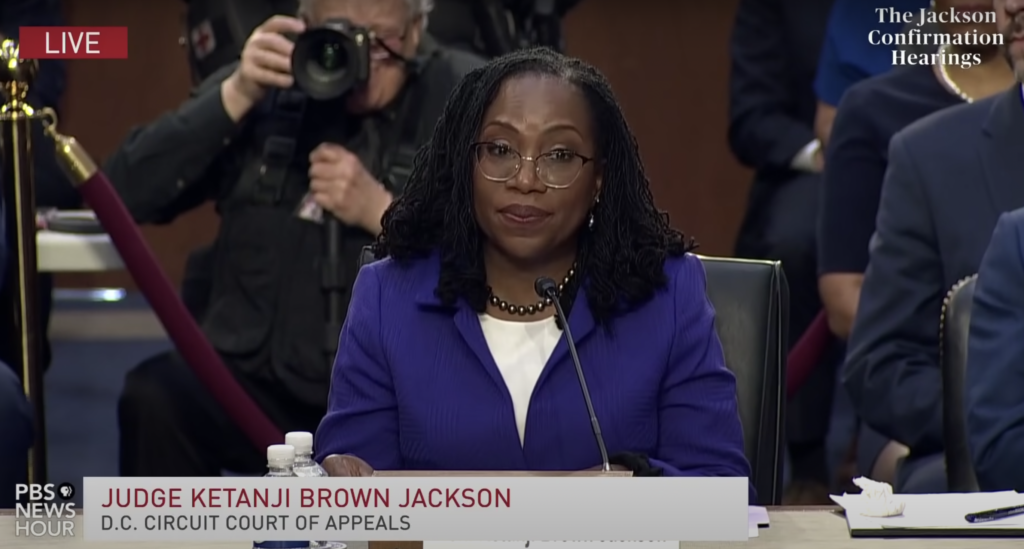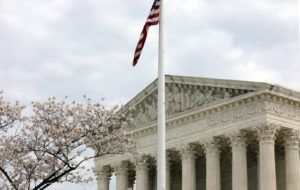
WASHINGTON (BP) – Historic U.S. Supreme Court nominee Ketanji Brown Jackson said Monday (March 21) on the first day of her confirmation hearing she recognizes her function as a judge is limited while she makes decisions from a neutral position.
Speaking to members of the Senate Judiciary Committee, Jackson said if she is confirmed, “I commit to you that I will work productively to support and defend the Constitution and this grand experiment of American democracy that has endured over these past 246 years.
“I decide cases from a neutral posture,” she said in her opening statement. “I evaluate the facts, and I interpret and apply the law to the facts of the case before me without fear or favor consistent with my judicial oath.”
Jackson, a judge on the District of Columbia Circuit Court of Appeals, appeared before the committee as the first African American woman nominated to the Supreme Court. President Biden announced Jackson’s nomination in late February after Associate Justice Stephen Breyer informed the White House of his retirement, which will take effect when the high court adjourns this summer.
Chelsea Sobolik, a Southern Baptist public policy specialist, recognized the barrier-breaking nature of Jackson’s nomination while pointing to the importance of the Judiciary Committee’s task.
“While Judge Jackson’s nomination to the Supreme Court is certainly historic, senators will need to gain a better sense of what guides her judicial philosophy,” said Sobolik, the director of public policy for the Southern Baptist Ethics & Religious Liberty Commission.
“As she goes through the Senate confirmation process this week, it is important for senators to gain clarity on issues such as life, religious liberty and the family,” she said in written comments for Baptist Press. “While her confirmation will not ultimately change the philosophical makeup of the court, it’s important to recognize that many Americans do not want a justice that would drastically alter the court.”
Jackson will face questioning from committee members the next two days of a four-day hearing. The committee will vote on a date yet to be announced regarding whether to forward her nomination to the full Senate.
In the evenly divided Senate, Democrats hold the edge in votes on the basis of Vice President Kamala Harris’ being able to cast tie-breaking ballots. They hope Jackson’s performance during the hearing will persuade some Republicans to vote for her confirmation, unlike the confirmation vote for Amy Coney Barrett in 2020. No Democrats joined what was then the GOP majority to vote for Barrett.
If confirmed by the Senate, Jackson, 51, would become the fourth female justice, marking the first time the Supreme Court has had that many women at the same time among its nine members. Jackson’s confirmation would make her the youngest current justice except for Barrett, 50, who was nominated by President Trump.
In her statement for the committee, Jackson said, “I know that my role as a judge is a limited one, that the Constitution empowers me only to decide cases and controversies that are properly presented. And I know that my judicial role is further constrained by careful adherence to precedent.”
Jackson told the senators she writes opinions that tend to be long “because I also believe in transparency, that people should know precisely what I think and the basis for my decision.”
“During this hearing, I hope that you will see how much I love our country and the Constitution and the rights that make us free,” she said. She has dedicated her career, Jackson said, to guaranteeing the words engraved on the front of the Supreme Court building – “equal justice under law” – are “a reality and not just an ideal.”
In expressing gratitude, Jackson said she “must also pause to reaffirm my thanks to God, for it is faith that sustains me at this moment. Even prior to today, I can honestly say that my life has been blessed beyond measure.”
“The first of my many blessings is the fact I was born in this great nation.”
Committee members, especially Democrats, acknowledged the historic nature of Jackson’s nomination in their opening statements.
Democrats, meanwhile, praised Jackson and her qualifications, while Republican members promised thorough questioning about her views.
Chairman Dick Durbin, D-Ill., described Jackson as a “champion for the rule of law.” Durbin said he has four words for critics who say she will be a “rubber stamp” for the Biden administration: “Look at the record.” Jackson has ruled for and against presidents of both parties, he said.
Sen. Chuck Grassley of Iowa, the lead Republican on the committee, promised the GOP members would ask “tough questions about Judge Jackson’s judicial philosophy.”
Some GOP members referred to past Democratic attacks on nominees by Republican presidents and pledged they would not attempt to smear Jackson’s character. Some Republicans also questioned why leftist organizations have supported Jackson’s nomination.
Most committee members did not mention abortion in their opening statements, but the issue is expected to be a focus of the questioning Jackson will undergo during the hearing. Though Jackson has not issued an abortion ruling, some organizations on both sides of the issue have commented on her nomination as if they expect her to be supportive on the high court of a right to the procedure.
The American Bar Association’s Standing Committee on the Federal Judiciary told Judiciary Committee leadership in a March 18 letter it unanimously found Jackson to be “Well Qualified” for the Supreme Court.
Biden had pledged during the 2020 presidential campaign he would select a Black woman for the high court.
Jackson served as a clerk for Breyer during the high court’s 1999-2000 term. Breyer, who is considered a member of the Supreme Court’s liberal wing, will have served nearly 28 years upon his retirement.
President Obama nominated Jackson as a federal judge in the District of Columbia, and the Senate confirmed her in 2013. Selected by Biden last year for the D.C. Circuit Court, Jackson received a 53-44 vote for confirmation in June. Three Republicans – Sens. Susan Collins of Maine, Lindsey Graham of South Carolina and Lisa Murkowski of Alaska – joined the Democrats to confirm her.
After graduating from Harvard Law School in 1996, Jackson served in a variety of public and private roles. These included service as a federal public defender in Washington, D.C., for two years and a stint as a staff member of the U.S. Sentencing Commission and another as vice chair of the commission.






















